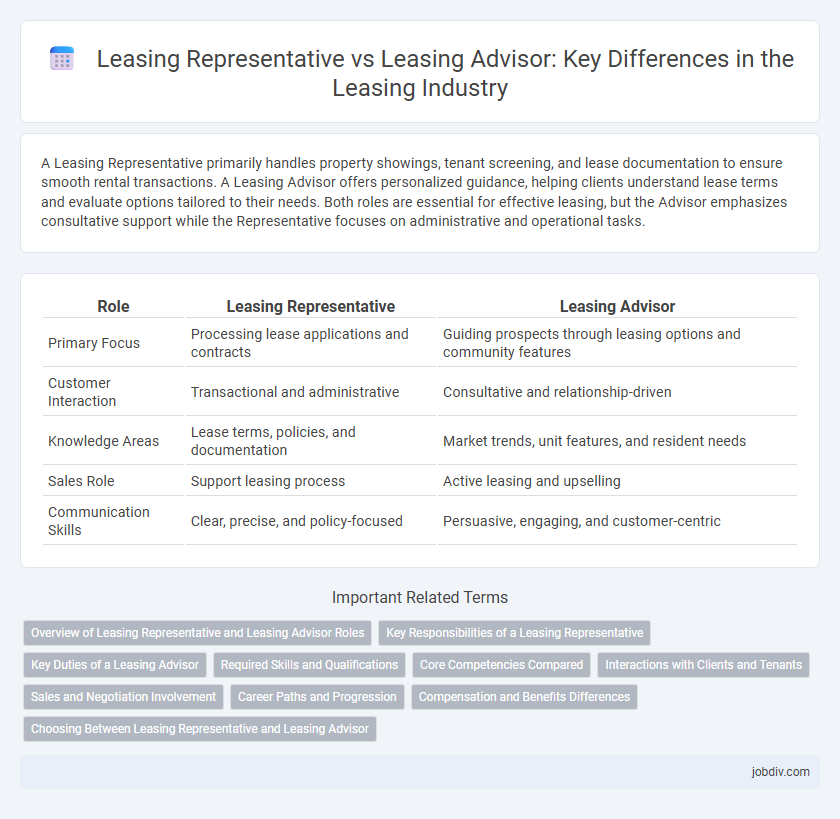A Leasing Representative primarily handles property showings, tenant screening, and lease documentation to ensure smooth rental transactions. A Leasing Advisor offers personalized guidance, helping clients understand lease terms and evaluate options tailored to their needs. Both roles are essential for effective leasing, but the Advisor emphasizes consultative support while the Representative focuses on administrative and operational tasks.
Table of Comparison
| Role | Leasing Representative | Leasing Advisor |
|---|---|---|
| Primary Focus | Processing lease applications and contracts | Guiding prospects through leasing options and community features |
| Customer Interaction | Transactional and administrative | Consultative and relationship-driven |
| Knowledge Areas | Lease terms, policies, and documentation | Market trends, unit features, and resident needs |
| Sales Role | Support leasing process | Active leasing and upselling |
| Communication Skills | Clear, precise, and policy-focused | Persuasive, engaging, and customer-centric |
Overview of Leasing Representative and Leasing Advisor Roles
Leasing Representatives primarily focus on managing property showings, processing rental applications, and ensuring compliance with leasing agreements to facilitate tenant occupancy. Leasing Advisors provide consultative support by offering market insights, answering client inquiries, and guiding prospective tenants through lease terms to optimize occupancy rates. Both roles are essential in maintaining tenant satisfaction and maximizing property revenue within the leasing management process.
Key Responsibilities of a Leasing Representative
Leasing Representatives primarily handle tenant inquiries, conduct property tours, and process rental applications to ensure smooth leasing transactions. They maintain accurate lease documentation, coordinate between property management and prospective tenants, and resolve tenant concerns efficiently. Their key responsibilities emphasize customer service, lease compliance, and promoting occupancy rates through effective communication and follow-up.
Key Duties of a Leasing Advisor
A Leasing Advisor primarily focuses on building relationships with prospective tenants by conducting property tours, explaining lease terms, and addressing tenant inquiries to ensure a seamless leasing process. They analyze tenant needs to recommend suitable properties and prepare lease agreements while maintaining strong communication to facilitate move-ins. The key duties emphasize customer service, property marketing, and contract management to maximize occupancy and tenant satisfaction.
Required Skills and Qualifications
Leasing Representatives must demonstrate exceptional interpersonal communication, customer service skills, and proficiency in lease agreement management to effectively handle tenant inquiries and leasing processes. Leasing Advisors require advanced knowledge of real estate regulations, market analysis, and negotiation techniques to provide strategic leasing solutions and optimize property occupancy. Both roles demand strong organizational abilities, attention to detail, and experience with property management software to ensure efficient lease administration.
Core Competencies Compared
Leasing Representatives excel in administrative tasks, tenant screening, and lease agreement preparation, demonstrating strong organizational and communication skills. Leasing Advisors possess in-depth knowledge of property features and market trends, enabling personalized tenant consultations and effective objection handling. Both roles require customer service expertise, but Leasing Advisors prioritize relationship-building and sales strategies, while Leasing Representatives focus more on operational support and lease processing efficiency.
Interactions with Clients and Tenants
Leasing Representatives primarily handle initial client interactions, guiding prospects through property tours and application processes to secure leases efficiently. Leasing Advisors focus on ongoing tenant relationships, addressing concerns, facilitating renewals, and ensuring tenant satisfaction to foster long-term occupancy. Both roles require strong communication skills, but Leasing Advisors emphasize personalized service and retention strategies for existing tenants.
Sales and Negotiation Involvement
Leasing Representatives primarily focus on presenting available properties, guiding prospects through application processes, and facilitating initial lease agreements, emphasizing straightforward sales techniques and basic negotiation. Leasing Advisors engage deeper in customized sales strategies, addressing tenant concerns with tailored solutions, and negotiating lease terms to optimize tenant retention and profitability. Their role demands advanced negotiation skills to balance landlord objectives and tenant satisfaction effectively.
Career Paths and Progression
Leasing Representatives typically start with entry-level responsibilities such as property tours, application processing, and tenant communications, providing a foundation for client interaction skills. Leasing Advisors often hold more advanced roles involving market analysis, lease negotiations, and strategic client relationship management, positioning them for leadership or specialized property management careers. Career progression from Leasing Representative to Leasing Advisor usually requires demonstrated sales performance, deeper industry knowledge, and strong interpersonal abilities, enabling growth into senior leasing or property management roles.
Compensation and Benefits Differences
Leasing Representatives typically receive a base salary combined with commission based on lease agreements signed, offering steady income with performance incentives. Leasing Advisors often have a higher commission rate and may receive bonuses tied to client retention and upselling services, leading to potentially greater earnings. Benefits for both roles usually include health insurance and retirement plans, but Leasing Advisors might have access to more comprehensive wellness programs and professional development opportunities.
Choosing Between Leasing Representative and Leasing Advisor
Choosing between a Leasing Representative and a Leasing Advisor depends on the specific needs of property management and tenant interaction. Leasing Representatives typically focus on administrative tasks, such as handling lease agreements and compliance documentation, while Leasing Advisors offer personalized guidance, assisting prospective tenants in understanding lease terms and property features. Evaluating whether your priorities lean more toward transactional efficiency or consultative support will help determine the ideal leasing professional for your real estate operations.
Leasing Representative vs Leasing Advisor Infographic

 jobdiv.com
jobdiv.com